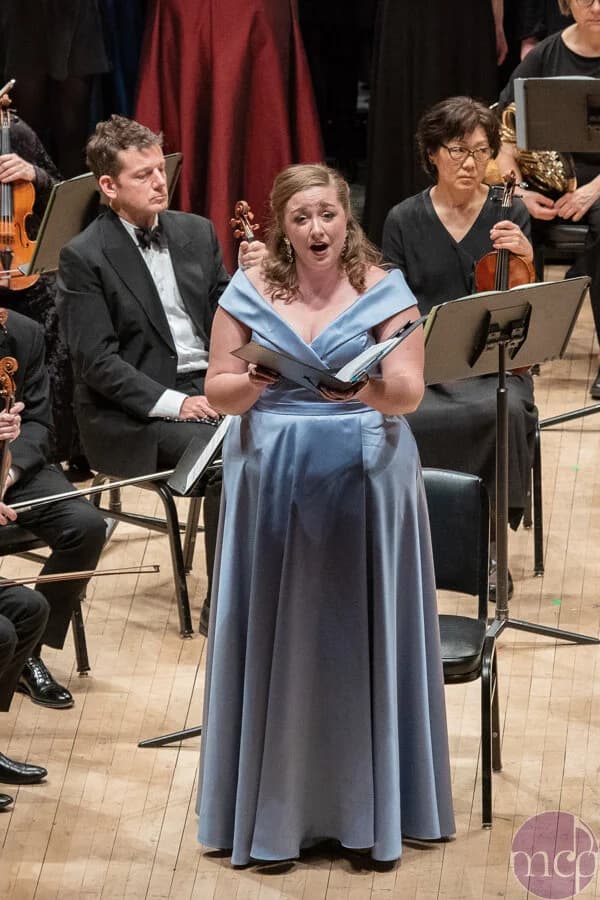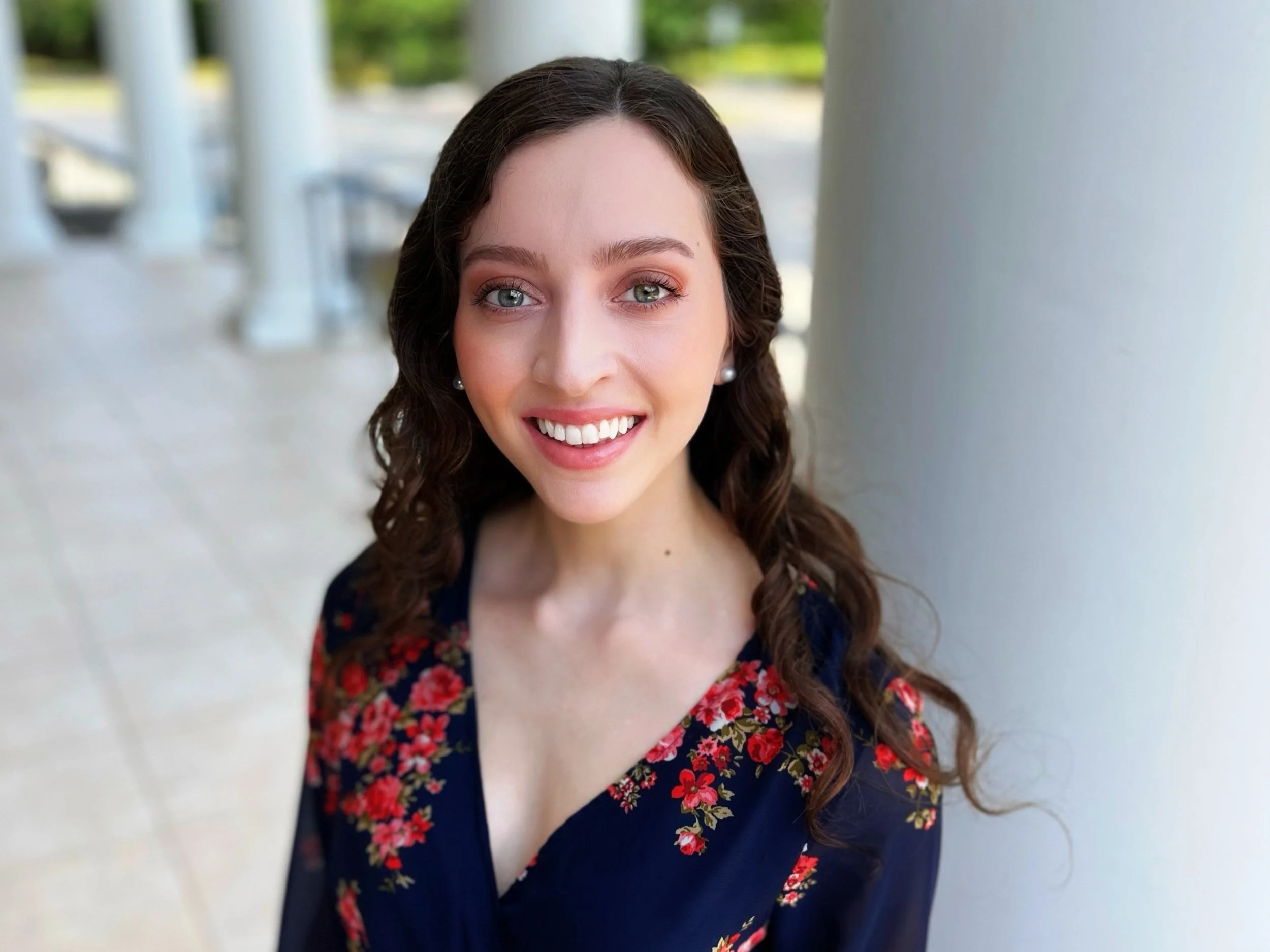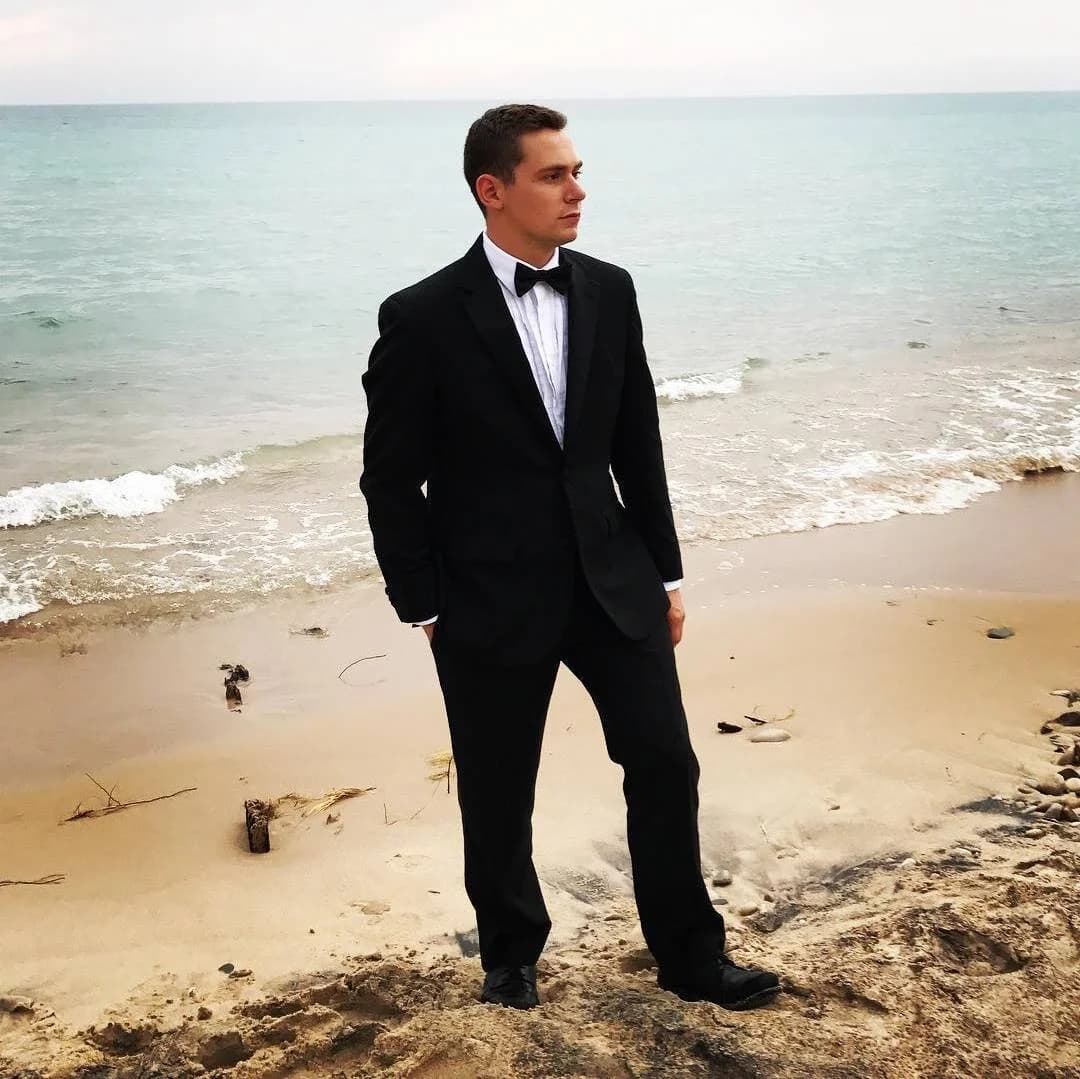A Conversation with Samuel Sparrow, Clarinetist of the Charlotte Symphony
By Garrett John Law

Welcome to Classically Minded. Today I am excited to talk with Charlotte Symphony Clarinetist, Samuel Sparrow!
Garrett: Hi Sam,
When I first thought of documenting musicians' experiences during Covid-19, you came straight to my mind. I've experienced the thrill of hearing you perform with the Charlotte Symphony, in concerts across Charlotte, online during the pandemic, and with our friends in the "before times". Your musicianship is stunning and I'm grateful to call you my friend. Let's get started!
What was it like to win a full-time orchestra job right out of your undergraduate degree at Manhattan School of Music?
Sam: I was so fortunate and excited to win my job with Charlotte Symphony; I won the audition three days before graduating from Manhattan School of Music! I had already committed to starting my master's degree at another university in the fall, but after a discussion with the clarinet professor, decided to withdraw and begin my career with CSO. I am also a North Carolina native, so I was very excited to come back to my home state and the home state of Cheerwine!
Preparation and organization are key for orchestral auditions. After the orchestra releases the audition repertoire, I begin preparations two months in advance. Most orchestras require 15-30 orchestral excerpts and a solo piece or two. You don't know which specific excerpts are required in each round until you arrive that day, so you need to be prepared to play any excerpt in any order. To stay organized, I keep a running list of every excerpt and number my comfort level with each from 1-10 to see which ones need the most attention. I also incorporate scales and fundamentals into my practice, but most of my time is spent on the excerpts.

Garrett: What were some of the biggest influences in your music education while at MSM?
To start, I had really phenomenal teachers. I studied privately with Mark Nuccio, Anthony McGill, and Pascual Martínez Forteza, all of whom are current or former members of the New York Philharmonic clarinet section. They are some of my biggest inspirations, both as artists and as people, and the work they continue to do is really incredible. I also worked as an usher at David Geffen Hall, the home of the New York Philharmonic, so I was able to hear fantastic concerts nearly every week. I was fortunate to also attend many phenomenal summer programs to gain additional orchestral experience.
This combination of great instruction, great concerts, and great experience helped prepare me for my audition and ultimately my career with Charlotte Symphony.
Garrett: What was it like to play with the New York Philharmonic?
Sam: In 2015, when I was a fellow at Music Academy of the West in Santa Barbara, I was one of 10 chosen as Zarin Mehta Fellows. We were able to play a subscription week with the New York Philharmonic and participate in lessons, coachings, and other career panels. It was especially meaningful for me because I got to play next to my teachers on stage. I was amazed at how fantastic the ensemble sounded at the first rehearsal, but also how quickly the players refined the program throughout the week. The New York Philharmonic holds a very special place in my heart, and I am so grateful to have had the chance to join them on stage.
Garrett: Tell us about your time in Switzerland.
Sam: Another fantastic opportunity I had was being a fellow at the Verbier Festival Orchestra in Switzerland for three years. Set in the Swiss Alps, the Verbier Festival forms an international student orchestra each summer, in addition to an alumni chamber orchestra, and also showcases solo and chamber artists from across the globe. The scenery was breathtaking, and I'll never forget starting each day by watching the sunrise over the Alps from my chalet balcony. The VFO often performs large orchestral and operatic repertoire that students rarely get to play; this was very fun, and sometimes very stressful too. I think the most notes I've ever had to cram was learning Mahler 9, Salome, and Elektra in just a few days after receiving part assignments upon arrival!
Garrett: What were some of your fondest memories as a young musician? Who inspired you? Was there a defining moment when you knew you wanted to be a musician?
Sam: I got into clarinet by accident. As a young kid, I took piano lessons, but the piano never stuck. In fourth grade, my school required us to take band or choir. I chose choir, but after one year switched to band because I thought the choir teacher was really mean. I wanted to play the flute, but the band had too many already. My second choice was drums, but my mother vetoed that. Finally, I settled for the clarinet, because if it was good enough for Squidward Tentacles, it must be good enough for me too. Pretty quickly after, I really started to enjoy clarinet, and after one year I joined my local youth symphony. From the first time I played in an orchestra, I realized this was my passion, even at such a young age, and from there I started on the path that led me to where I am now.
The same year, I also started studying with Jimmy Gilmore, the now-retired Principal Clarinet of the North Carolina Symphony. I studied with Jimmy for 7 years, and we still frequently keep in touch! In addition to refining my technical abilities, Jimmy nurtured my love for music; he often loaned me recordings and sheet music to explore between lessons. He encouraged me to work hard and reach for new opportunities and is one of my biggest influences to this day.
One piece that has always been a favorite of mine is Copland's Appalachian Spring. The evocative opening, expansive harmonies, and thematic material based on Simple Gifts all really speak to me and perfectly capture the beauty of a crisp morning in the North Carolina mountains.

Garrett: How has the pandemic affected your professional life as a musician?
Sam: The pandemic has been particularly tough for musicians because concerts require large audiences and close quarters among performers. Unfortunately for woodwind players, there aren't any playing masks that are fully effective or practical for our instruments either, so my performance opportunities evaporated very quickly.
When we first went into lockdown in March 2020, I thought our Symphony shows would just be canceled for a few weeks. After the Symphony canceled the remainder of our winter season, I was still hopeful that we could reschedule much of it to June or July and move our summer season to August; but once the summer season was canceled too, reality set in for me.
I've had a number of low points throughout this pandemic. I thrive when I have things to work toward, so seeing a blank performance calendar for months at a time has been extremely difficult. I also went stir crazy at home, both from a lack of work and lack of seeing friends. Though my partner Chip has been a fantastic companion throughout the pandemic, and I am so grateful to have him in my life.
For most of the pandemic, I haven't felt motivated to practice. I love the clarinet and I love making music, but without the external motivation of rehearsals and concerts, practicing for practicing sake felt very artificial, and I needed some time away to process everything I was feeling during the pandemic.
Garrett: Have you found any silver linings to the pandemic?
Sam: One of the silver linings is that I've been able to devote more time to teaching: I have 8 weekly students now, (and have room for more, so feel free to refer more aspiring clarinetists!) in addition to coachings and other educational presentations. Over the summer, I also took a free class at Yale and have had more time to cook and try new recipes. For perhaps the first time ever, I've been getting eight hours of sleep every night.
Garrett: How has the Charlotte Symphony responded?
Sam: Charlotte Symphony had to quickly adapt to the post-Covid world. We resumed operations in the fall of 2020 by providing digital and outdoor performances and continuing our educational work remotely. We've also implemented strict safety and social distancing protocols that have allowed us to make music safely. Everyone throughout the organization has really come together to weather this storm, and I feel particularly fortunate to remain employed: other orchestras have taken severe pay cuts or been furloughed completely.
Now that testing and vaccines are more readily available, I feel even more hopeful that life is beginning to return to some sense of normalcy, and I am very grateful to see performances reappearing on my calendar! I am certain that the first time we are back as a full orchestra with an audience will be a moment I will never forget.
Garrett: What performances have you been able to do during quarantine?
Sam: In the meantime, I have been fortunate to record a few chamber programs with my CSO colleagues, perform for a few churches, and play for some other recitals and projects as well. I have never gone so long without performing as I did in 2020, and I cannot be more excited to get back to it as we approach summer and fall!
Garrett: Agreed. Speaking of performances, let's take a moment to share some of your work. This is "Winds in the Woods" a concert from June of 2020 as part of the Charlotte Symphony's "al Fresco" series. I invite our audience to enjoy this concert featuring Samuel Sparrow and Charlotte Symphony musicians playing the following woodwind chamber works:
- MUCZYNSKI Movements for Wind Quintet
- HAYDN Divertimento No. 1
- FARKAS Antiche Danze Ungheresi
The performance starts at 5 minutes and 17 seconds into the video
Garrett: Tell us about the diverse clarinet repertoire that we should be listening to. Where should one start? What are some gems that are underplayed?
Sam: That really depends on where your interests lie because the clarinet has such a wide range of repertoire. Unless you're looking for Baroque music because the clarinet didn't rise to fame until the early classical era, which is a real shame.
Some of my favorite repertoire for clarinet is the clarinet quintets, which are scored for clarinet plus string quartet. Mozart, Brahms, Weber, and Coleridge-Taylor each have a fabulous version! There are also some great trios with piano and strings by Beethoven, Brahms, Khachaturian, and Bartok; and there's no shortage of great sonatas, including Saint-Saëns, Poulenc, Bernstein, Zenobia Powell Perry, and so many more.
In terms of contemporary repertoire, the composer/clarinetist Eric Mandat has really expanded the sonic possibilities of the clarinet; I'd suggest starting with his piece Folk Songs. There's some great music out there for clarinet and percussion. In fact, I'll be playing some of it at a CSO Brewery show coming up! My favorites are Impromptu by William A.R. May and And Legions Will Rise by Kevin Puts.
The clarinet has also found itself in many other genres like jazz, for example, Benny Goodman, and Klezmer, check out the Klezmaniacs! Another favorite artist of mine is Doreen Ketchens, a masterful black female bandleader, educator, and clarinetist in New Orleans. I've also been listening to the artist Kronodigger; he combines clarinet with original electronic and EDM tracks.
There is an endless amount of repertoire out there, but these are some great places to start!

Garrett: I know you are a firm believer in the power of music to change lives. How can we support diversity and accessibility in our own city, Charlotte, NC?
I absolutely believe in the power of music to change lives. For starters, there are numerous studies documenting how music benefits cognitive development and memory. Beyond this, however, music can be a unifying force by bringing together people from all different walks of life.
Within our city of Charlotte, there are some great programs and artists to support! Starting with my own Charlotte Symphony, CSO runs a number of programs to increase access to performances and educational opportunities, including $1 tickets for patrons receiving public assistance, and Project Harmony, a free afterschool program in collaboration with Arts+ that provides music training and instruments to underserved families and neighborhoods in Charlotte. A number of other organizations offer great educational arts opportunities as well, including Youth Orchestras of Charlotte, Charlotte Ballet, the Choir School at St. Peter's, and Children's Theater of Charlotte.
Another great way to support local art is to patronize local artists directly. Charlotte is fortunate to have a wide variety of diverse artists in many different genres, so seek them out, purchase their albums, attend their shows, share pictures and credit their murals, and spread awareness. In addition to Charlotte artists, be sure to support small, minority, and female-owned businesses as well!
I also encourage Charlotteans to learn more about our city's history and role in perpetuating systemic racism to better understand why supporting diversity and accessibility is so important. Policies like redlining, urban renewal, and eminent domain for highway construction have disproportionately displaced communities of color. The 2016 shooting of Keith Lamont Scott brought national attention to CMPD and the continuing epidemic of police brutality. Systemic racism is also present in less obvious places like historic Elmwood and adjacent Pinewood cemeteries; Elmwood being a historically all-white burial ground and Pinewood all-black, the two burial grounds were segregated well into the 20th century, and a fence was erected to separate them in the height of the Jim Crow era which was not removed until 1969 through the efforts of Charlotte's first black city councilman, Fred Alexander.
There are so many great resources available to help individuals and corporations further their equity, diversity, and inclusion efforts. Take the time to research resources related to your city, your work, your social circles, and your own implicit biases, and be sure to support the organizations and non-profits advancing these efforts in your own community.
Garrett: Thank you so much for joining us. It was a pleasure to have you as a guest and we look forward to hearing from you again!


